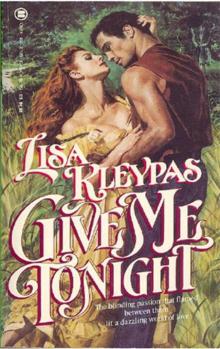- Home
- Lisa Kleypas
Dreaming of You Page 6
Dreaming of You Read online
Page 6
She spent every morning sitting in the kitchen, the largest and busiest room in the club. All of Craven’s employees passed through the kitchen to take their meals and socialize, from the croupiers who ran the tables to the house wenches emerging after long nights of arduous activity.
The kitchen was well-stocked and meticulously organized. Three rows of assorted pots and pans hung over the heavy central worktable. The walls were lined with barrels of flour, sugar, and other supplies. A variety of sauces simmered on the long black stoves, sending a bewildering but delectable mixture of fragrances through the air. All of it was the domain of the chef, Monsieur Labarge. Years ago Mr. Craven had hired Labarge and his entire staff from an exclusive Parisian restaurant and had them all transferred to London. In return for their staggeringly high salaries, they provided the best cuisine in the city: a luscious cold buffet kept in constant supply for the club members and exquisitely prepared meals that were served in the dining rooms.
Monsieur Labarge was temperamental, but he was a genius. As far as Sara could tell, even Mr. Craven took care not to provoke him. Guessing at the chef’s weakness for flattery, Sara made a special effort to praise his creations, until the ends of his mustache fairly quivered with pride. Now he insisted on serving her his specialties, many of them renamed in honor of Mathilda.
The kitchen was filled with constant activity; boys and scullery maids occupied with menial tasks of washing, chopping, scraping, and kneading, and servants laden with trays of food for the diners. The staff readily included Sara in their conversations as they related stories that ranged from ribald to touchingly sad. They loved to talk and watch her write down what they said. Soon they began to compete to catch her interest. The prostitutes were especially helpful, giving Sara insights about the men who visited the club in droves ... and about Derek Craven in particular. Sara particularly enjoyed Tabitha’s lively chatter. Although they were quite different in temperament, outwardly they shared a striking resemblance, both of them the same size and height, with chestnut hair and blue eyes.
“I’ll tell ye about the fine lords what come ‘ere,” Tabitha said, her blue eyes filled with a sly twinkle. “They likes the ruttin’ awright, but they’re the worst in the sack. Two shakes of a tail an’ it’s done.” The other house wenches laughed in agreement. The four of them gathered around Sara at one of the wooden tables, while kitchen boys brought plates of delicate omelettes a la Mathilda and crusty rolls. “That an’ the fine victuals ... thafs what draws ‘em ‘ere. But the cards is what makes ‘em stay.”
“How many men are you expected to consort with each night?” Sara asked in a businesslike tone, her pencil poised over her notebook.
“Whatewer we feels like. Sometimes we lets ‘em ‘ave a tiddle downstairs in the card rooms, an’ then—”
“Tiddle?” Sara repeated, perplexed, and the prostitutes burst out laughing.
“Just a little touch an’ feel,” explained Violet, a short, robust blond. “An’ if they like the goods, the usher takes ‘em upstairs an’ we does ‘em over.”
“Newer Mr. Craven, though,” Tabitha said. “ ‘E newer asks any ow us to ‘is bed.”
“ ‘E gets it from ‘igh-kick women,” Violet commented sagely. “Countesses an’ duchesses an’ such.”
At this mention of Mr. Craven’s sexual preferences, Sara felt her blush heighten to scarlet. The more she learned about him, the more of a puzzle he presented. His inner qualities were concealed by a smooth diamond-hard facade. He was a showman, first and foremost. Skillfully he provided a surfeit of elegant decadence that satisfied not only the aristocratic belle monde but also the shadowy world of libertines and courtesans called the demimonde. His courtesy to his social superiors was always slightly overdone, crossing the threshold of politeness into subtle mockery. Sara was certain he respected very few of them, for he was familiar with their darkest secrets. Through his own network of spies and informants, he knew about the lovers they took, the contents of their wills, even the marks their sorts made at Eton and Harrow, and what they stood to inherit.
It seemed that few men felt comfortable enough to ask about the dreadful slash on his face. Members of the royal family; Wellington, the famed military commander; and the foreign diplomats who loved to lounge at the hazard-table all possessed an air of quiet unease when Craven was present. When he made a joke, they laughed a little too jovially. When he made a suggestion, it was usually followed with alacrity. Apparently no one cared to risk earning his displeasure.
As Craven had claimed the first night she had met him, he was never angry. Sara had observed that his mood could range from cold silence to biting sarcasm, but he never shouted or lost his self-control. He was a figure of mystery; arrogant, self-mocking, sociable and yet intensely private. Underneath his most congenial smiles lurked an ever-present shadow of bitterness.
Sara’s attention was drawn back to the conversation as Tabitha mused aloud over Craven’s preference for aristocratic ladies. “Won’t touch anyone lower than a baroness.” She laughed heartily at the sight of Sara’s curiosity. “Ye should see ‘em at the assembly balls, the ‘ighborn bitches. Those fine ladies lust after our Mr. Craven, they do. An’ why not? ‘E’s a good, solid man, not like their soft, lazy ‘usbands what cares for cards an’ drink more than women.” She lowered her voice conspiratorially. “Built like a bull ‘e is, an’ just where it counts.”
“ ‘Ow does ye know?” Violet asked suspiciously.
“I’m friends wiv Lady Fair’urst’s maid Betty,” came Tabitha’s smug reply. “She told me once she walked in on the two of ‘em by accident, ruttin’ in broad daylight while Lord Fair’urst was gone to Shropshire.”
The pencil dropped from Sara’s lax fingers, and she ducked under the table to pick it up. She could feel her pulse racing. It was one thing to listen in detachment when a stranger was being discussed, but how could she ever face Mr. Craven again? Mortified, fascinated, she emerged from beneath the table.
“Newer say!” one of the women exclaimed. “What did they do?”
“Lady Fair’urst threw a royal fit. Mr. Craven just laughed an’ said to close the door.”
The whores giggled merrily. “What’s more,” Tabitha continued, “you can always tell what a man’s got by the size ow ‘is nose— an Mr. Craven’s got a nice long one.”
“It’s not the nose,” Violet said dismissively. “ Tis the size ow the feet.”
With the exception of Sara, they all cackled like a coven of amiable witches. Amid the hilarity, Tabitha leaned her head on her hand and stared at Sara as an idea occurred to her. “ ‘Ere’s a plan, Miss Fielding—why don’t you bring Mathilda ‘ere tomorrow to meet Mr. Craven? They’d make a grand pair.”
The other women chimed their agreement. “Aye, she’d melt ‘is heart!”
“Yes, yes, do!”
“She’d wrap Mr. Craven ‘round ‘er little finger!”
Even Monsieur Labarge, who had been eavesdropping on the conversation, broke in impulsively. “For la belle Mathilda, I will make the finest gateau, so light it would float in the air!”
Sara smiled apologetically and lifted her shoulders in a helpless shrug. “I can’t, I’m afraid. There is no Mathilda. She ... she’s only a work of fiction.”
The table was abruptly quiet. All of them stared at her with puzzled expressions. Even the kitchen boy had paused in the midst of stacking dishes.
Sara attempted to explain further. “You see, I created the character of Mathilda as the result of detailed research and discussions. She’s really a composite of many women I encountered when—”
“I ‘eard as ‘ow Mathilda’s joined a convent now,” Violet interrupted, and Tabitha shook her head.
“Nay, she ‘as a rich protector. I’ve a friend what saw her walking along Bond Street, just the other day. Credit at all the finest shops, ewen Madam Lafleur’s.”
“What was she wearing?” one of the women asked eagerly.
Tabitha proceeded to d
escribe Mathilda’s lavish frock and the footman who had followed behind her. While the lively conversation continued, Sara reflected on what Tabitha had said about Mr. Craven and his affair with Lady Fairhurst. She wondered if love had been any part of his liaisons. He was a complex man, treading on the thinnest edge of respectability. No doubt it satisfied his sense of justice, carrying on affairs with the wives of aristocrats who secretly disdained him for his commonness. And it must be difficult for him to suppress a mocking smile as he counted his nightly earnings, the patrimonies he skillfully stripped from the young lords who considered themselves infinitely superior to him. It was a strange world he had created for himself. He was as apt to spend his time with the watchmen, pimps, and street urchins who were part-time employees of the club as he was with the highborn patrons. It was impossible to fit such a man into any category. Sara spent a good deal of time thinking about him, her mind filled with endless questions about who and what he was.
Sara paused in the midst of her writing in order to take a morsel from the plate of pastries Monsieur Labarge had sent up to her. The delicate layers of cake and coffee cream seemed to dissolve in her mouth. Flecks of sugar drifted to the polished mahogany in front of her, and she quickly wiped them away with her sleeve. She was sitting in one of the rooms of Craven’s private apartments, working at his large mahogany desk. The stately piece of furniture, with its innumerable compartments and small drawers, was cluttered with intriguing odds and ends; pieces of string, loose coins, dice and cribbage pins, notes and receipts. It seemed as if he ritually emptied his pockets at his desk. She wouldn’t have expected it of a man who conducted his life with such meticulous precision. As she consumed the last bite of cake, a few slips of paper piled in a corner of the desk caught her eye. Intrigued, she began to reach for the folded notes. Abruptly she stopped and scolded herself for even thinking of violating Mr. Craven’s privacy.
She bent again to her writing, carefully dipping the ivory-handled pen in a pot of ink. But she was unable to resume her train of thought. Idly she speculated on what the mysterious notes might contain. Setting down the pen, Sara stared longingly at the slips of paper, while her conscience waged a war with her curiosity. Unfortunately the latter won out. Quickly she plucked the notes from their resting place.
The first note was a list of random tasks, with Worthy’s name written across the top:
Worthy,
Riplace carpits in card rums 2 and 4 Credit to be rifused to Lords Faxton and Rapley until acounts seteld. Have Gill sampel next brandy delivry ...
Sara felt compassion as she glanced over the laboriously scrawled note. Craven’s handling of the written word was nothing short of a massacre. On the other hand, there was nothing wrong with his mathematics. On a few occasions she had observed him multiplying and dividing figures in his head with bewildering speed, easily juggling betting odds and percentages. He could watch a card game in progress, silently calculate the cards that had been played, and predict the winning hand with unfailing accuracy. He glanced over the account books and rapidly totaled columns of figures without ever reaching for a pen.
His other talent was just as extraordinary—an apparent ability to see inside peoples’ minds. He could unerringly sense a well-hidden vulnerability and skewer it with a casual remark. His alert gaze took note of every nuance in a person’s expression, in a tone of voice ... It made Sara realize with some surprise that he was every bit the observer she was, that he also felt a distance between himself and the rest of the world. At least, she thought, that was one thing they had in common.
Sara picked up the second note, which was inscribed in an elegant feminine style, all pretentious loops and curls. It was an odd, abrupt message which gave her a cold sensation.
Now you wear my mark for everyone to see. Come take your revenge if you dare. I still want you.
—J
“Oh, my,” Sara whispered, staring at the elaborately scrawled initial. She had no doubt the reference to a “mark” meant the slash on Craven’s face. What kind of woman would pay to have a man’s face ruined? How could Craven consort with such a female? Slowly Sara put the letters back in place, not wanting to see any more. Perhaps this “J” felt a kind of twisted love for Craven that was aligned with hatred. Perhaps Craven felt the same for her.
It was difficult for Sara, who had always known love as a gentle and comforting emotion, to understand that for others it was sometimes dark, primitive, sordid. “There are so many things I don’t know,” she muttered, taking off her spectacles and rubbing her eyes. Perry had always been helpless in the face of her “moods” ... He saw little reason one should be interested in anything outside Greenwood Corners. She had learned to conceal her occasional frustrations from him, or he would give her one of his lectures about being sensible.
Her thoughts were interrupted by a quiet voice from the doorway. “What are you doing in my apartments?”
Sara turned in the chair and flushed. Derek Craven stood there, an unfathomable expression on his tanned face. “I’m sorry,” she said with an appealing glance. “Usually I work at Mr. Worthy’s secretaire, but he asked if I would use your desk today, since you were gone and he needed—”
“There are other rooms you could have used.”
“Yes, but none that offered privacy, and I can’t work with distractions, and ... I’ll leave now.”
“That’s not necessary.” He walked toward her. Although he was a large, powerfully built man, he moved with catlike grace. Sara lowered her head, focusing on the desk blotter. Out of the corner of her eye she saw Craven touch her discarded spectacles. “How many of these do you have?” he asked, nudging them an inch across the surface of the desk.
“Only two.”
“You leave them everywhere. I find them on bookcases, desks, edges of picture frames, wherever you happen to set them aside.”
Sara picked up the spectacles and adjusted them on her face. “I can’t seem to remember them.” she admitted. “It’s very disconcerting. I take an interest in something, and then just forget them.”
Derek’s gaze moved to the neatly formed sentences before her. “What’s this?” Deliberately he leaned over her, bracing his hands on the gleaming expanse of mahogany. Stunned, Sara shrank in the chair, while his arms formed a cage on either side of her.
“I-I’m writing about the rookery.”
Derek grinned at her overly casual tone. He knew exactly how much his nearness bothered her. Deciding to prolong her torment, he leaned over her more deeply, glancing at the tantalizing hint of fullness in her bodice and the flash of white skin above the lace at her neck. His chin nearly touched her lace cap as he read aloud from her notes. “The ... city streets are ... om ....” He paused, concentrating on the difficult word.
Automatically Sara located the word with the tip of her finger. “Ominous,” she said. “It means haunting ... sinister.” She straightened her spectacles as they slipped on her nose. “It seemed an appropriate way to describe the atmosphere of the rookery.”
“I’ll describe it better,” he said flatly. “It’s dark and it stinks.”
“That’s true enough.” Sara risked a glance over her shoulder. He was close enough that she could see the grain of black whiskers beneath his shaven skin. His exquisite clothes and the pleasant trace of sandalwood scent couldn’t conceal the brutality that simmered so close to the surface. He was a rough, masculine man. Perry Kingswood would be disdainful of him. “Why, he is nothing but a ruffian!” Perry would exclaim. “A peasant in gentleman’s attire!”
Somehow Craven seemed to read her thoughts. “Your young man in the village ... Kingsfleld ...”
“Kingswood.”
“Why does he let you come to London alone?”
“I’m not alone. I’m staying with the Goodmans, a very respectable family—”
“You know what I’m asking,” Derek said curtly. He turned to face her, half-sitting on the edge of the desk. “You spend your time with gamblers, whores
, and criminals. You should be safe with your family in Greenwood Corners.”
“Mr. Kingswood isn’t pleased with the situation,” Sara admitted. “We had words about it, in fact. But I was very stubborn.”
“Do you ever tell him about the things you do in London?”
“Mr. Kingswood knows about my research—”
“I’m not talking about your research,” he murmured, his eyes hard. “Are you going to tell him you killed a man?”
Sara blanched guiltily, feeling slightly sick as she always did when she thought of that night. She avoided his piercing gaze. “I don’t think there would be much point in telling him.”
“Oh, you don’t. Now I see what kind of wife you’ll be. Sneaking behind the poor bastard’s back to do things he doesn’t approve of—”
“It’s not like that!”
“It’s exactly like that.”
“Perry trusts me,” Sara said sharply.
“I wouldn’t trust you if I were in his place.” His mood turned caustic. “I’d keep you with me every bloody minute of the day— no, I’d have you fitted with a ball and chain—because I know that otherwise you’d be running off to do ‘research’ in the nearest dark alley with every cutthroat and pimp you can find!”
She folded her arms and regarded him with tight-lipped disapproval. “There’s no need to shout at me, Mr. Craven.”
“I’m not ...” Derek’s voice faded into silence. He had been shouting, something he never did. Amazed, he rubbed his jaw and stared at her, while she returned his gaze like an inquiring little owl. Her fearless attitude provoked him beyond reason. Didn’t anyone understand how much she needed someone to look after her? She shouldn’t be allowed to wander through London by herself. She shouldn’t be here alone with him, for God’s sake. He could have ravished her ten times over by now.
As he continued to study her, he realized that beneath the cloud of frills and the spectacles, there was an attractive woman. She would be appealing if she didn’t dress like a spinster. He raised his hand to her puffy cap, his fingertip brushing an edge of lace. “Why do you always wear this thing on your head?”

 Devil in Spring
Devil in Spring Sugar Daddy
Sugar Daddy Devil in Winter
Devil in Winter Dreaming of You
Dreaming of You Christmas Eve at Friday Harbor
Christmas Eve at Friday Harbor Love, Come to Me
Love, Come to Me Only With Your Love
Only With Your Love Suddenly You
Suddenly You Secrets of a Summer Night
Secrets of a Summer Night Cold-Hearted Rake
Cold-Hearted Rake Where's My Hero?
Where's My Hero? Gifts of Love
Gifts of Love Married by Morning
Married by Morning Then Came You
Then Came You Wish List
Wish List Where Dreams Begin
Where Dreams Begin A Historical Christmas Present
A Historical Christmas Present Somewhere I'll Find You
Somewhere I'll Find You Scandal in Spring
Scandal in Spring Someone to Watch Over Me
Someone to Watch Over Me Worth Any Price
Worth Any Price Prince of Dreams
Prince of Dreams It Happened One Autumn
It Happened One Autumn Love in the Afternoon
Love in the Afternoon Devil's Daughter
Devil's Daughter A Wallflower Christmas
A Wallflower Christmas Tempt Me at Twilight
Tempt Me at Twilight Brown-Eyed Girl
Brown-Eyed Girl Mine Till Midnight
Mine Till Midnight Again the Magic
Again the Magic Lady Sophia's Lover
Lady Sophia's Lover Because You're Mine
Because You're Mine Midnight Angel
Midnight Angel Smooth-Talking Stranger
Smooth-Talking Stranger Blue-Eyed Devil
Blue-Eyed Devil Hello Stranger
Hello Stranger Dream Lake
Dream Lake Devil's Daughter: The Ravenels Meet the Wallflowers
Devil's Daughter: The Ravenels Meet the Wallflowers A Christmas to Remember
A Christmas to Remember Smooth Talking Stranger
Smooth Talking Stranger Crystal Cove
Crystal Cove Marrying Winterborne
Marrying Winterborne Stranger in My Arms
Stranger in My Arms Devil in Disguise
Devil in Disguise Worth Any Price bsr-3
Worth Any Price bsr-3 Give Me Tonight
Give Me Tonight Rainshadow Road fh-2
Rainshadow Road fh-2 Seduce Me At Sunrise
Seduce Me At Sunrise I Will
I Will Someone to Watch Over Me bsr-1
Someone to Watch Over Me bsr-1 Lady Sophias Lover bsr-2
Lady Sophias Lover bsr-2 A Hathaway Wedding
A Hathaway Wedding A Hathaway Wedding (Hathaways Bk2.5)
A Hathaway Wedding (Hathaways Bk2.5) Worth Any Price - Bow Street 3
Worth Any Price - Bow Street 3 Christmas with Holly
Christmas with Holly